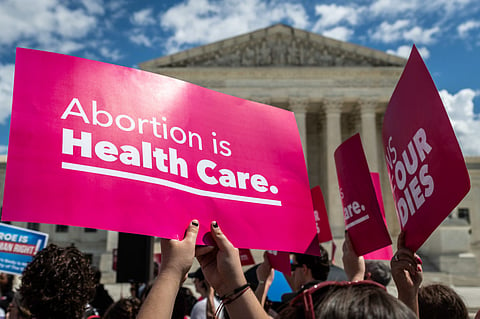
New Delhi: On March 8, France became the first country in the world to recognise abortion as a constitutional right. Although termination of pregnancy is legal in many European countries, France moved a step further by recognising abortion as a constitutional right.
A colorful ceremony, which took place in Paris, marked the event — which was the major highlight on women’s day.
The French Parliament approved the amendment with overwhelming support as many far-right lawmakers also supported the law.
The French constitutional amendment was hailed by the proponents of women’s rights across the world.
Emmanuel Macron, an upbeat French President, also backed the inclusion of abortion rights in the European Union’s charter. However, this proposal of the French President could face stiff resistance in the EU as several countries, particularly those with catholic majority population practice prohibition on abortion.
In June 2022, anti-abortionist clinched a victory in the United States when a Supreme Court ruling struck down the 1973 decision of Roe V. Wade, which guaranteed the constitutional right to abortion.
Since then, at least 21 states across the US have taken steps to ban or restrict abortions.
While a large number of countries permit abortion, the majority of them permit it under certain circumstances. Globally, 22 countries have a comprehensive ban on abortion.
Anti-abortionist across the globe have advocated for legal restrictions or prohibitions on abortion procedures, viewing the termination of a human life morally wrong. Roman Catholicism and certain evangelical Protestant groups are vehemently opposed to it.
In 2012, Savita Halappanavar, a dentist of India origin, living in Ireland, succumbed to sepsis after her request for an abortion was denied on legal grounds.
Her death spurred a debate on the reproductive rights of the women in a predominantly Roman Catholic country, resounding to a pro-abortion rights movement.
In the 2018 referendum, Irish people voted by a two-thirds majority to legalise the medical termination of pregnancy.
Had Savita Halappanavar, who was 17 weeks pregnant, been in her home country, she could have survived because the Medical Termination of Pregnancy (MTP) Act, 1971 allowed for abortion up to 20 weeks of gestation.
Now, the amended law permits abortion up to 24 weeks of pregnancy for rape survivors.
The 2021 amendment also covered unmarried women.
However, in 2023, the Supreme Court of India allowed a rape survivor from Gujarat to terminate her 27-week pregnancy, overruling a Gujarat High Court order that denied her request.
In fact, after the 2021 amendments in the MTP Act, there is no time limit for abortion if the fetus has developed abnormality. The final decision in this regard will be taken by a medical board comprising a gynaecologist, a pediatrician, a radiologist and a doctor appointed by the government for that region.
In 2017, the Supreme Court recognised the constitutional right of women to make reproductive choices, as a part of personal liberty under Article 21 of the Indian Constitution. The judgment recognises sexual and reproductive decisions as a key aspect of personal liberty.
A member of the medico legal cell at the King George’s Medical University (KGMU) told The Mooknayak, “All the cases of abortion have to be reported to the CMO (Office of Chief Minister), where the records are kept. However, the cases of rape and the underage abortions are to be reported to the police as they are medico-legal cases.”
Reproductive rights of a woman encompass a wide spectrum of rights from the access to contraception to right, fertility treatment, prenatal services etc. The issue of abortion has long divided society all over the world. In fact even the women rights activists seem to be having differing opinions regarding abortion rights.
A large section of the women activists are of the opinion that the right to abortion is an indispensable right and forms the bedrock of reproductive rights, which are the cornerstone of women empowerment.
In 1994, the United Nations International Conference on Population and Development (UNPIN 1994) envisaged making the rights of women and their reproductive health a central topic in national and international economic and political development efforts.
It also affirmed that reproductive health and women’s empowerment are interdependent, and both are necessary for social progress.
Also Read-
You can also join our WhatsApp group to get premium and selected news of The Mooknayak on WhatsApp. Click here to join the WhatsApp group.